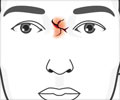
‘It is possible to protect people from severe meningococcal meningitis by using nose drops containing genetically modified friendly bacteria.’
Tweet it Now
The results of the study published in the journal Science Translational Medicineshow that they produced strong immune response against bacteria that cause meningitis and also long-lasting protection.Meningitis occurs in people of all age groups but affects mainly infants, young children and the elderly. Meningococcal meningitis, is a bacterial form of the disease causing 1,500 cases a year in the UK and can lead to death few hours after the symptoms start.
Around 10% of adults carry N. meningitidis in the back of their nose and throat with no signs or symptoms. It can invade the bloodstream and lead to life-threatening conditions including meningitis and blood poisoning ('septicaemia).
The 'friendly' bacteria Neisseria lactamica (N. lactamica) also lives in some people's noses naturally. By occupying the nose, it protects from a severe type of meningitis by acting against its close cousin Neisseria meningitidis (N. meningitidis).
The new study data shows that nose drops of N. lactamica prevented N. meningitidis from settling in 60% of participants by effectively displacing N. meningitidis.
Advertisement
Apart from inducing a stronger immune response, those modified bacteria stayed longer for at least 28 days, with most participants (86%) still carrying it at 90 days without any adverse symptoms.
Advertisement
This study shows that we can potentially adapt the antigens in our bacteria to combat a multitude of infections that enter the body through the upper respiratory tract.
In addition to the delivery of vaccine antigens, advances in synthetic biology using a genetically modified bacteria to manufacture and deliver therapeutics molecules in the near future.
This new promising way of preventing life-threatening infections, without drugs is an approach that can be critical in the face of growing antimicrobial resistance.
Source-Medindia














